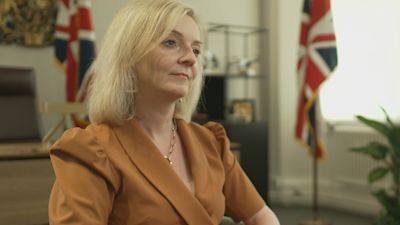Import of hormone-treated beef 'not happening' says Trade Minister, Liz Truss

Imports of hormone-fed beef are “not happening,” says Liz Truss
The Secretary of State for International Trade says none of the trade deals she negotiates will permit imports of hormone-treated beef to enter the UK.
The final details of a trade agreement between the UK and Australia are in the process of being thrashed out.
Both sides are hoping to be able to make a formal announcement before the end of the month.
Liz Truss has told ITV News that, although the ambition is to encourage trade between the two countries by removing tariffs and quotas on a wide range of goods, the deal won’t include unfettered access for Australian meat.
Imports of hormone-fed beef are “not happening,” Ms Truss said.
In Australia, the use of veterinary drugs to rear larger cattle is widespread and is considered safe by the regulatory authorities.
But hormone-fed beef is banned in Europe and Ms Truss has pledged to uphold that ban, along with a ban on chlorine-washed chicken.
"If the UK government is making hormone-treated beef a red line in negotiations with Australia, the US and other trade partners, this will provide some protection for British cattle farmers, who are not allowed to give their own animals hormones," said John Springford, from the Centre for European Reform.
"But it will also curtail some of the benefits of these free trade agreements for consumers, by keeping cheaper Australian beef out of British supermarkets.
"Generally it’s not yet clear whether the government wants to max out trade deals to help consumers and offset trade barriers with the EU – or to protect British businesses."
For more political news, listen to our podcast - Calling Peston
When it comes to the production of food, European regulators tend to act on a precautionary basis.
They examine the scientific evidence, measuring impacts on human health, but they also consider wider concerns about production methods - even if a threat to health has not been established.
As a result, the EU has taken a harder stance on pesticides than many countries and it moved quickly to tightly restrict genetically modified food.
Brexit gives the UK the freedom to diverge from EU food standards and, ever since the referendum, farmers and environmental groups have been concerned that the government would be willing to make concessions on food standards in order to secure trade deals with other countries, particularly the United States.
"It’s our responsibility to set standards for imports into the UK. And I’ve been very clear that we’re not changing those in order to get a trade deal with the US or indeed anyone else," Ms Truss said.
Liz Truss pledged to ensure that the trade agreement with Australia will include protections for lamb and beef farmers in the UK who worry that they won’t be able to compete with cheaper imports from Australian farmers.
"I am going to make sure that we have the right support for our farmers, that they are able to compete on a level playing field," said Ms Truss.
"That’s an important principle".
Liz Truss won’t allow hormone-fed beef and chlorinated chicken to enter the UK but is more open to the idea of imports of genetically modified food.
"I do think this is an area where we can be different from the EU," she told ITV News.
"But, of course, it’s got to be on the basis of UK scientific advice and the decisions made by UK ministers.
"It is ultimately the responsibility of the Environment Secretary to decide what is safe, what is right for the UK".The government launched a consultation on the use of gene editing to modify livestock and food crops in England in January.
The results have yet to be published.